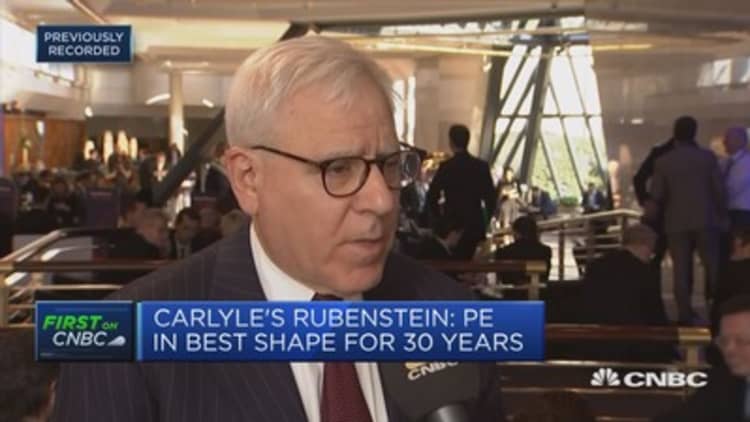
The Donald Trump administration is doing well with the business community, in large part thanks to its tax cuts package, billionaire private equity investor David Rubenstein told CNBC on Wednesday.
Speaking at the SuperReturn private equity and venture capital conference in Berlin, Germany, the Carlyle Group co-founder was positive in his review of the White House's major economic policy moves.
"I think most business people are pretty happy with the administration," Rubenstein said. "I think there are some things the administration has done that the business community will not like, but generally I think the administration has pleased the business community and other people as well.
"I think the tax cut bill is seen as very positive for the economy in the United States by most people."
The U.S. tax system underwent its first major overhaul in more than 30 years in December when the Republican-led Tax Cuts and Jobs Act was passed, slashing corporate tax rates from 35 percent to 21 percent.
Most business people agreed that U.S. corporate taxes had been too high for too long, blunting America's competitiveness. The CEOs of J.P. Morgan, Cisco, Apple, Walmart and many more lauded the tax cuts, and several companies issued bonuses for their employees.
Apple announced in January it would contribute $350 billion to the U.S. economy and create 20,000 jobs over the next five years, thanks to the new tax law.
The most common corporate reaction so far has been in the form of share buybacks and dividend increases. Bank of America Chief Executive Brian Moynihan told investors in January that the "largest portion" of tax savings would "flow to the bottom line through dividends and share buybacks," and Rubenstein has echoed that outlook.

Lawmakers remain sharply divided over whether the new rates will either be a boon to the American middle-class or exacerbate income inequality. Supporters of the bill claim it will boost middle-class wages by an average of $4,000 annually, while its detractors argue it will balloon the national deficit.
Wall Street investor Paul Tudor Jones is among a few of the financial titans critical of the changes — he said in early February that policymakers should have rejected what he saw as "fiscal impropriety associated with this most recent tax cut."
But the markets remain "in very good shape," according to Rubenstein. More generally, while accepting the likelihood of an eventual slowdown, the financier and philanthropist was optimistic on the current state of the global economy.
"The economy will probably slow down at some point, but I don't see a slowdown in the European or U.S. economies this year, and probably not next year," Rubenstein said. "At some point maybe in 2020, but right now I think the U.S. and European economies are in very good shape."


